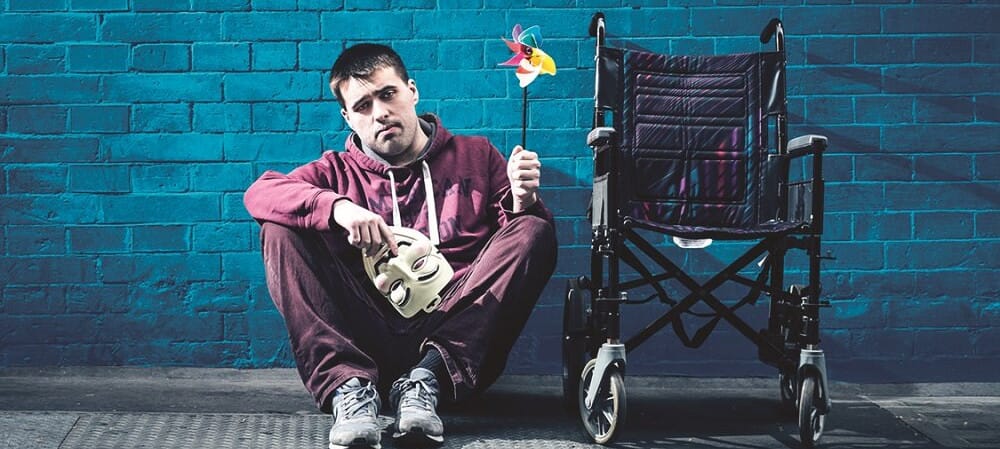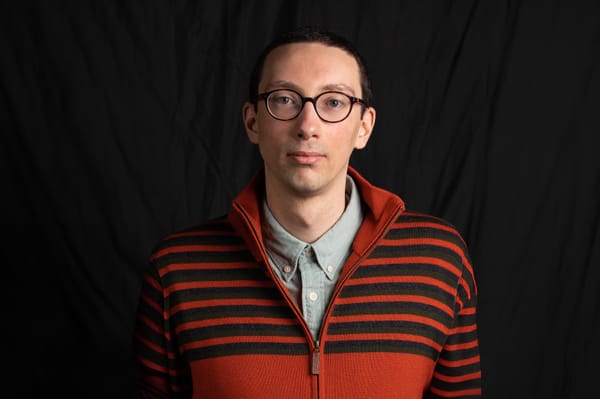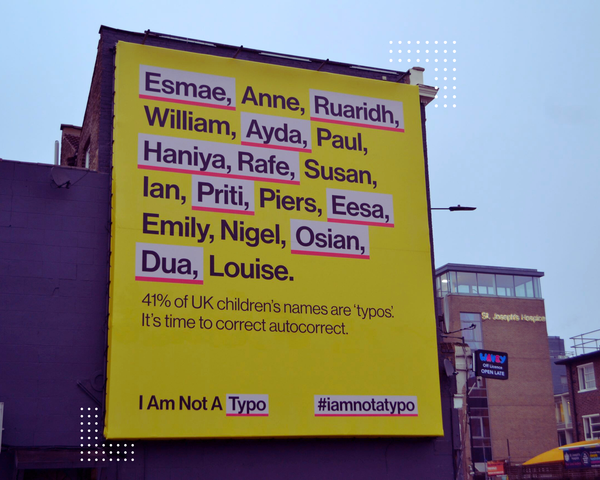Why Representation Matters for Disabled Actors
An Interview with actor Cian Binchy

Access the Audio Read version of this article directly on Spotify for Podcasters.
“It’s important that we see disabled characters played by disabled actors. It’s a lot more authentic.”
In November 2020, writer, actor and creative collaborator Gemma Harvey sat down for a video interview with Cian Binchy, actor, performance poet and autism consultant for film and theatre productions - and star of critically-acclaimed The Misfit Analysis, his own one-man show. Cian Binchy, 30, is one of the very few autistic actors getting visibility in the UK’s creative arts, and is currently one of the digital influencers for Access All Areas, a theatre company that makes disruptive theatre and performance by learning disabled and autistic artists.
The two, who have previously worked together, exchanged views on how the performing arts can become more inclusive for disabled actors, and truly celebrate their talents.
Gemma Harvey: So you and I have known each other for a little while now. Would you like to talk about how we first met, and the sort of work we’ve done together?
Cian Binchy: We first met at a special place called the Lyric Theatre in Hammersmith. I was performing one of my poems, and I think a mutual friend of ours who’s also an actor and performer introduced us. We later got to know each other properly when you got involved with Access All Areas and since then we’ve done loads of work together including me being in Doctors, when you were my Creative Enabler and what a great job you did!
Harvey: Oh thank you! So on that note, please could you tell us a little bit about yourself and the sort of work you do.
Binchy: I am a performance poet and an actor, acquainted with the theatre company Access All Areas. They are a theatre charity based in Hackney, North East London. I’m also a digital influencer for Access All Areas.
Harvey: Wow, we’ll definitely talk about digital influencing in more detail later. Can you start by sharing a little bit about your experience in the industry and what you’ve been up to lately?
Binchy: For years I was messed about and not given the opportunity to do anything professional, just silly bits and pieces. Actually, not everything was silly, some of it was good; I did some pantomimes which were great, but I didn’t get to the professional world of performing arts until Access All Areas came along. I got into Access All Areas through somebody who worked at another autism charity based at TreeHouse School, which is a school my younger brother went to; they’re called Ambitious About Autism - AAA, the three lucky letters! They told me about a course held at the Royal Central School of Speech and Drama run by Access All Areas. I’ve been involved in lots of incredible theatre shows, MADHOUSE re:exit and unReal City. I’ve worked on TV shows, including a detective drama called The Level and most recently a drama called Grace. And my one-man show The Misfit Analysis which I developed with Access All Areas, was first performed at Central and then went to the Edinburgh Fringe festival. We did a few shows in London, including the Rich Mix theatre and also performed at several theatres in Manchester and Birmingham. Even Mexico, would you believe it?
.jpg)
Harvey: Where was your favourite place to perform?
Binchy: That is a big question. Overall I think my favourite place would have to be Edinburgh because I think it’s one of the most beautiful cities in the world. It was really great to work there. It was an overwhelming and very challenging experience but a fantastic nevertheless and one that will stick with me for the rest of my life.
Harvey: Can you talk about the opportunities that have created exposure for you as an artist. And would you say more opportunities have evolved from you having your own show?
Binchy: To be honest, I think having my own show has helped. But it's thanks to Access All Areas for all the exposure. If it wasn’t for them I would never have had all these opportunities, like being on TV, and performing at Edinburgh and touring. Before Access All Areas I was just doing poxy bits of theatre outside church halls, doing maybe a bit of Grease or Romeo and Juliet, with people clapping and thinking ‘Aww look at these lovely disabled people performing! At least they’re out of the house and have something to do!” Access All Areas took it seriously. If it wasn’t for them I wouldn’t be where I am, they have saved my life.
Harvey: You just highlighted something really important there, that if perhaps you hadn’t trained and started working with Access All Areas, you wouldn’t have had the opportunity to be taken seriously as an actor. Unfortunately due to a lot of societal ignorance, people assume that because of your disability you’re unable to be an actor, and that could not be further from the truth. Why do you think it’s important that the creative industry takes responsibility to reflect society?
Binchy: It’s important that the industry tells more or less the truth. It’s OK to make up a story, but it’s important for people from minorities and marginalised groups to turn on the TV or go to the cinema and the theatre and see people that we can all identify with. Because if all we see are white middle class families and nothing else, then we just think ‘hang on, what about us?’’. I also think it’s important that characters written for the marginalised and minority groups are played by actors of that marginalised minority. It’s important that we see disabled characters played by disabled actors. It’s a lot more authentic. Don’t get me wrong, I do think a non-disabled actor could play a disabled character very well and you know, ‘crip up’ and what not, but it’s just not the same because you don’t actually understand what it’s like to have a physical or learning disability. And often what happens is that people in my position get opportunities to teach and become kind of ‘autism consultants’, which is basically teaching the actors how to be autistic and instead of getting paid we get a picture of the cast, and that’s all we get. I mean, you might as well give me a picture of Goofy or Minnie Mouse! I just think it’s so patronising and condescending. I’ve had the opportunity to play characters that are disabled and I feel very privileged for that and that’s all thanks to Access All Areas.
Harvey: Well I think we’re the lucky ones because we work with Access All Areas but of course, not everyone knows about the company or that it even exists. So has this happened to you then, have you taught an actor to play someone with autism?
Binchy: Yes, I have.
Harvey: And it sounds like the experience wasn’t particularly positive.
Binchy: Well, it was positive and I got on very well with the actor that played Christopher on The Curious Incident [of the Dog in the Night Time--Ed.] but it just makes me feel a little hey, when is my chance to play? I’m an actor who’s disabled - why are you getting me to teach these people? And you know the people were very nice and I thought Luke Treadway was f*cking fantastic as Christopher, but at the same time I thought ‘hang on - shouldn’t somebody in my position be playing Christopher’?
Harvey: Exactly, and may I just ask - were you ever given the opportunity to audition for the role of Christopher?
Binchy: No, I was not.
Harvey: I rest my case. One more thing that you mentioned, and some people might not know this is a term, so can you explain what ‘cripping up’ means?
Binchy: Ok. ‘Cripping up’ isn’t necessarily connected to autism, it’s more to do with physical disabilities. Say if you’re not a wheelchair user but you’re playing a character in a wheelchair, that’s cripping up: you’re not crippled but you make it look like you’re crippled. It’s similar to if you’re white and paint your skin black and put on an afro wig, that is ‘blacking up’. Now everyone knows that blacking up is not acceptable, and I agree with that. ‘Cripping up’ is also not acceptable. There’s another term within the autistic community, ‘spazzing up’, when someone is pretending to be autistic but they’re not. Again, similar to blacking up but people don’t take it seriously, people seem to think that ‘cripping up’ or ‘spazzing up’ is acceptable, but no, it really f*cking isn’t. And people seem to think they can get away with it, but you know what? I hope in 20 years time people will look back on that, thinking ‘Oh god what have we done? How embarrassing!’.
Harvey: I completely agree. On that note, do you think there are other areas of the industry that need to make a change?
Binchy: I think all areas need to change. Things are getting better but we still have a long way to go. I’m just talking about my own experience as a marginalised person with a learning difficulty, but there are millions of other people in marginalised groups, and I think there should be more opportunities for them in the arts. One of the big problems in the theatre is they seem to be very good at coming up with really sh*t excuses for not giving us opportunities, like ‘Oh, we didn’t have time’ or ‘Oh, nobody with a learning disability auditioned for the job’. But why do you think nobody with a learning disability auditioned for it? Do you think this is a coincidence? Do you think we all saw the opportunity but just ignored it and didn’t want it? I don’t think so. And about not having enough time, what do you mean you didn’t have enough time? What is the hurry? Like ‘Oh, we must get this done by now! Oh we can’t find anyone with a learning disability! Yeah, you’ll do!’. It’s very sneaky and it’s a problem. They know we may need extra support but are too scared to help us. It’s like it’s too challenging to give us the opportunity.
Harvey: Absolutely, I think they have a big list of excuses ready to go! It’s probably good to point out that Access All Areas has a ‘best practice’ model and there’s proof that it works. The industry just needs to stop being scared of ‘change’. There are lots of disabled and learning disabled actors out there who have the experience, but they’re never given the opportunities. Would you also say you get typecast because of your disability?
Binchy: To be honest, I think I might have but don’t necessarily think that’s a bad thing. I would like the opportunity to play different characters so guess that means I am slightly typecast but it doesn’t bother me because at the end of the day, I am f*cking lucky to be getting these opportunities, because most people in my position don’t get them. It’s very rare for these opportunities to come for somebody in my position, although things are getting better.
Harvey: What characters do you usually play?
Binchy: Quite vulnerable characters. I would love to play a baddie, that would be so f*cking cool.
Harvey: We don’t tend to see many baddie characters written for people with autism. Do you think TV producers and creatives are apprehensive of writing autistic characters with other personality traits because they’re fearful of casting them in a negative light?
Binchy: Possibly. You know, we often have a lot of anger because we’re oppressed. I’m not saying we should do bad things but we kind of think bad thoughts, we have our demons.
Harvey: And you have to work very hard to keep them controlled, don’t you.
Binchy: I work my ass off every day fighting my demons [laughs--Ed.].
Harvey: Thanks for sharing that with us [laughs--Ed.]. So as you know, the creative industry, especially film and TV is very fast-paced, and changing constantly. Specifically in TV, scripts get changed at the last minute, etc. Quite a generalised point of view is that people with autism don’t like change. Can I ask if that’s the same for you, and if so, what are your coping mechanisms to be able to deal with working in an industry that constantly changes?
Binchy: When I first got into the industry, it was quite tough for me, all the change was a bit overwhelming but I’ve got more used to it now. It’s always daunting and you obviously have to prepare for things. I’m very aware that change always happens. In these times we’re living in, it’s something I really have to work hard at.
Harvey: I’d like to focus a little bit more on your personal work. Before I met you, I saw you performing your spoken word and I was completely blown away. Can you tell us a little bit more about your development process?
Binchy: I started writing poetry when I was thirteen. I was very young and always into rap music; I used to write all of these ridiculous raps about being a gangster and all that sh*t which I so wasn’t, [laughs--Ed.]. But I was young and I didn't really know what I was doing, I was just discovering myself. I started performing raps at the Lyric Theatre in Hammersmith and doing workshops there, and eventually as I grew, my raps got less rap like and more like poetry. I started writing about real life, about having autism and also this really weird fantasy world that had goblins and unicorns, and things like that. I wrote a range of different things. I have a million inspirations - poets that inspire me are Benjamin Zephaniah and John Cooper Clarke, musicians like The Cure, The Smiths, Robbie Williams, Michael Jackson, Prince, David Bowie, Eels, The Flaming Lips, Mike Skinner from the Streets; the list is endless.
Harvey: And does your poetry feature in The Misfit Analysis, or is completely separate?
Binchy: Yeah, a bit of my poetry featured in The Misfit Analysis. And a special poem I developed with Jess Mabel Jones featured in the show MADHOUSE re:exit.
Harvey: And to finish off, can we talk about your role as a digital influencer with Access All Areas? What does it involve?
Binchy: It involves me looking at the internet, going online and looking at all the current things that have been happening in the theatre world and putting them on social media. It’s been a learning curve for me because I’m not used to Twitter or Instagram at all; so it’s been really challenging but a very good experience nonetheless. It’s also me promoting Access All Areas and putting them out there for people who probably haven’t heard of them, presenting behind the scenes videos and interviewing people from the industry including directors and actors, I also provide commentary on theatre news. I like to think it’s a bit like me returning Access All Areas the favour and saying thank you for all the things they’ve done for me. It’s a fantastic job!
For more information about Cian Binchy and the work of Access All Areas, please visit Access All Areas website. For more information about Gemma Harvey, please click here.





